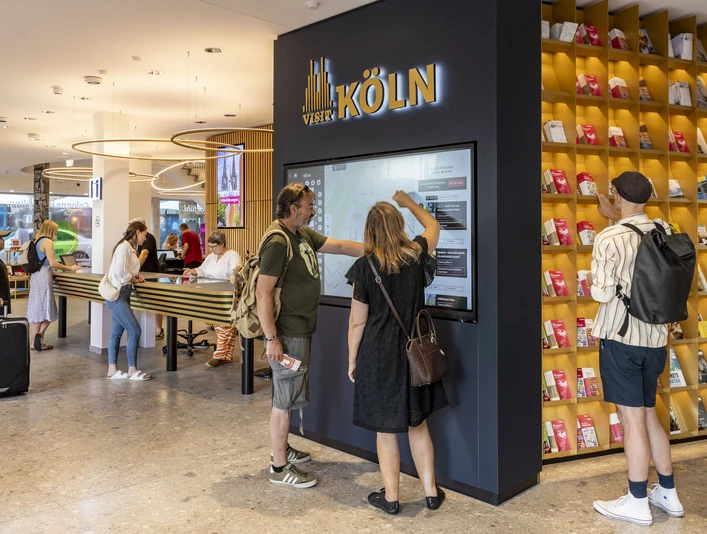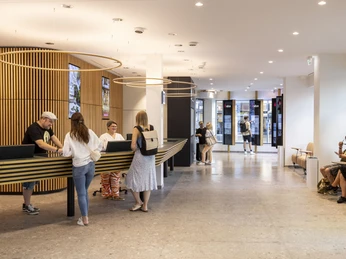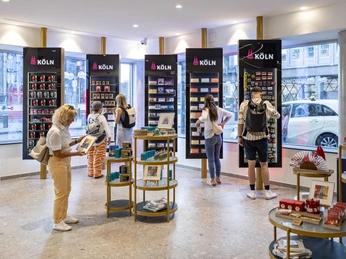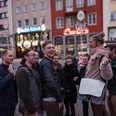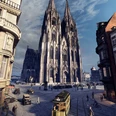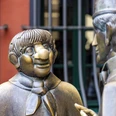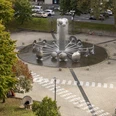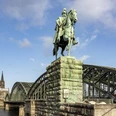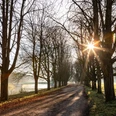The modern concept integrates contemporary informational habits with the stylistic charm of the '50s. Thus, listed elements stand alongside digital stations, conversation islands, and touchscreens as complements or alternatives to personal consultations and service in multiple languages. A cozy book and reading corner invites you to stay and browse before you head upstairs via the original '50s curved staircase to the “balcony with a view” where you also find the inspirational gift shop.
From Touchscreen to Your Own Smartphone – or Analog
Through a large interactive map or via one of the touchscreens at the counters, you can browse various route suggestions or use the experience planner for sights, events, dining tips, or hotels in the foyer. Everything can be transferred to your smartphone via QR code – for when you're on the go. This also works with regard to personal consultations at the counters.You can find answers to frequently asked questions about your stay in Cologne, such as “Where can I charge my phone?” in the FAQ – with various informational materials available classically in print on-site or as PDF for download.
Centrally Located and Welcoming: Including Souvenir Shop on the 1st Floor with a View of the Cathedral
Conveniently located in close proximity to the main train station, Cologne Cathedral, Hohe Strasse, and the old town, the Tourist Information at Kardinal-Höffner-Platz 1 offers you a perfect start for your visit: Get inspired here for your exciting stay in Cologne.But before you put your Cologne plans into action, don’t forget to take in the view from the window on the 1st floor of the main portal of the Cathedral. This is also where the CologneShop is located with Cologne souvenirs, brand, fan, and decorative items, as well as many accessories.
A Little Journey Back to the Tourism of the '50s...
Not only because of its listed architecture and interior design with mosaic columns, wall murals, and staircase does the Tourist Information stand as an exemplar of the '50s. As an institution it also reminds you of the years of progress and economic boom. After the austere post-war years, in the '50s and with the advent of the economic miracle, Germans slowly rediscovered their wanderlust: Dolce Vita instead of drudge work, guesthouses, and guest rooms instead of staying home. Besides tours on foot, by bike, or train to the seaside or the Black Forest, many people also returned to the Rhine metropolis of Cologne.The first point of contact was often just this house of tourism with its three golden crowns on the bay window – symbolically for the Three Wise Men, whose relics rest directly opposite in Cologne Cathedral. A lovely symbolic connection, don’t you think?
House of Tourism from 1955
The building was erected in 1955 following the plans of the renowned Cologne architect Hans Joachim Lohmeyer, who was significantly involved in the city's reconstruction. The factual, simple facade, and functional design is typical of the 1950s architecture, as these buildings could be efficiently constructed and flexibly used for various offices. The old “traffic office” with its tourism department was destroyed in the war.The latest modernization with its new interior reminiscent of the 1950s has made the building not only touristic but also energetically fit for the future – everywhere if possible, in consideration of existing monument protection regulations.
Good to know
Eligibility
Suitable for any weather
for Groups
for Class
for families
for individual guests
Suitable for the Elderly
Openings
Price info
Payment methods
Directions & Parking facilities
Nearby
